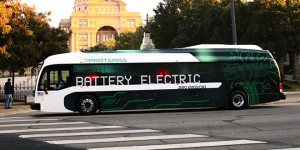 With all the focus on electric cars, it’s easy to overlook the impressive success that electric buses are having. The buses are more expensive than traditional diesel-powered buses (typically at about $700,000), but they have minimal operating costs due to low maintenance and relatively cheap electricity as fuel. As a result, they already present a strong value proposition to transit agencies.
With all the focus on electric cars, it’s easy to overlook the impressive success that electric buses are having. The buses are more expensive than traditional diesel-powered buses (typically at about $700,000), but they have minimal operating costs due to low maintenance and relatively cheap electricity as fuel. As a result, they already present a strong value proposition to transit agencies.
Electric buses also offer a significant environmental upside, both on carbon pollution and conventional air pollutants, as E&E News reported [paywalled]:
Converting the entire U.S. fleet of diesel transit buses — around 40,000 vehicles — to electric could avoid 2 million tons of greenhouse gas emissions each year, according to a recent report by Environment America, U.S. PIRG and the Frontier Group.
As transit agencies seek to retire old diesel buses, they are increasingly turning to zero-emissions technology, determining that it’s cheaper in the long run and provides significant public health benefits. Boesel estimates that around 5 percent of new U.S. bus sales are electric right now. Around 1 percent of new car sales are electric.
So not only are electric bus sales outperforming electric passenger vehicle sales right now, they are projected to dominate in the near future. Bloomberg New Energy Finance forcecasted electric buses to constitute 84% of new bus sales around the world by 2030, compared to 28% of new passenger vehicle sales by that same year.
We’ll be hosting the chief executives of two of the leading electric bus companies, Proterra and BYD, at our upcoming June 8th conference at UCLA on zero-emission freight at Southern California’s ports. Register now to hear more from them, as space is limited.


